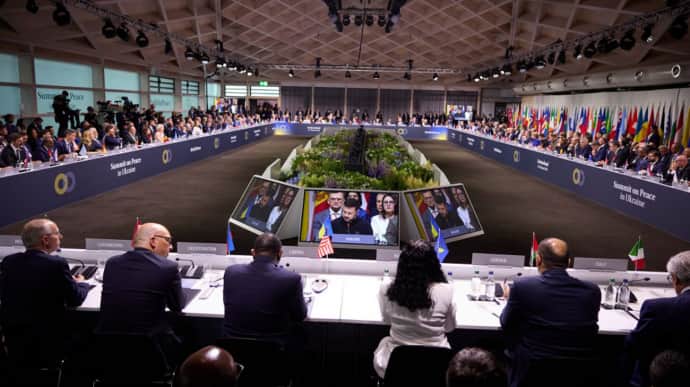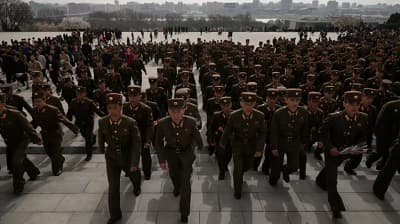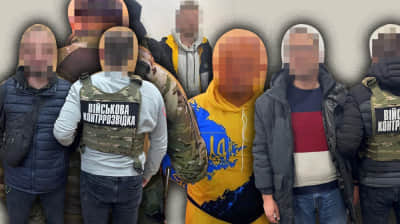Sociologists ask which of three options for ending war suits Ukrainians most

The president of Ukraine speaks at the first plenary session of the Global Peace Summit held on 15-16 June in Switzerland with the participation of representatives of 93 countries. Photo: Office of the President of Ukraine
The majority of Ukrainians consider the option of ending the war with peace agreements under which Ukraine would have to postpone its joining of NATO and liberating the temporarily occupied territories to be categorically unacceptable, while more moderate options are more readily accepted.
Source: results of a poll conducted by the Kyiv International Institute of Sociology (KIIS) from 16 to 22 May and from 20 to 25 June 2024
Details: Sociologists note that they conducted a small experiment of their own by pairing certain concessions into a package with other important conditions.
They explained this by saying that previously a separate question was voiced for each individual concession, but in reality, any agreements are package deals that may contain both a carrot and a stick.
Sociologists say that a person may reject a certain concession, but if it is included in a package with other, more important aspects, such a package may be approved, albeit without enthusiasm.
KIIS modelled three illustrative packages of agreements and asked respondents to answer how they would treat this package. One package was randomly selected for each respondent (the proposals in the package were also presented to different people in a different order).
The sociologists also emphasised that they specifically added the option "it is a difficult compromise, but generally acceptable" because it allows a person to express consent to a certain compromise in a more socially acceptable way.
The packages themselves were as follows:
Package 1:
- Russia retains control over all currently occupied territories
- Ukraine refuses to join NATO
- Ukraine becomes a member of the European Union and receives all the necessary funding from the West for reconstruction
Package 2:
- Although Ukraine does not officially recognise it, Russia retains control over the occupied territories of Zaporizhzhia, Kherson, Donetsk, Luhansk oblasts and Crimea
- Ukraine becomes a member of NATO and has genuine security guarantees
- Ukraine becomes a member of the European Union and receives all the necessary funding from the West for reconstruction
Package 3:
- Although Ukraine does not officially recognise it, Russia retains control over the occupied territories of Donetsk and Luhansk oblasts and Crimea
- Ukraine regains full control over Zaporizhzhia and Kherson regions
- Ukraine becomes a member of NATO and has genuine security guarantees
- Ukraine becomes a member of the European Union and receives all the necessary funding from the West for reconstruction
After analysing the results, sociologists concluded that option 1, postponing the liberation of the currently occupied territories, a ban on joining NATO, and accession to the EU, is supported by 38%, but for the majority – 54% – this option is unacceptable.
At the same time, option 2, Ukraine gaining NATO membership (in addition to EU membership), even with the postponement of the liberation of the currently occupied territories, is supported by 47%, while 38% are categorically against it.
And option 3, with Ukraine liberating at least Kherson and Zaporizhzhia oblasts in addition to NATO and EU membership, is supported by 57% (albeit mostly as a "difficult compromise" since other territories will remain under Russian control). This option is unacceptable for 33%.
Quote from KIIS: "It is important to take into account the following points: although Ukrainians are flexible and open to discussions on the parameters of peace agreements, they clearly do not agree to ‘peace on any terms’. The attitude to the packages under consideration shows that if the packages included Russia's current demands, the vast majority would outright reject them."
The survey also shows that the issue of security and protection against future invasions is critically important, even a priority.
"The issue of returning all the territories is a burning question for the population. KIIS polls show that the vast majority of the population would like to restore full territorial integrity. However, some may consider this a more distant possibility and are now rather trying to take a ‘pragmatic’ view of the issue. These results show that regaining control over the entire Kherson and Zaporizhzhia oblasts in the short term would be especially desirable for Ukrainians," the sociologists said.
The survey was conducted on 16-22 May and 20-25 June. The method of telephone interviews based on a random sample of mobile numbers was used to interview 1,067 respondents on May 16-22 and 2,008 respondents on June 20-25. The survey was conducted with adult citizens of Ukraine (aged 18 and older) who resided in government-controlled territory of Ukraine at the time of the survey. The sample did not include residents of the territories temporarily not controlled by the Ukrainian authorities (however, about 2% of each sample includes Ukrainians who moved from the occupied territories), and the survey was not conducted with citizens who left the country after 24 February 2022.
Formally, under normal circumstances, the statistical error of such a sample (with a probability of 0.95 and taking into account the design effect of 1.3) did not exceed 4.1% for the May survey. For the June survey, an experiment was carried out with 2,008 respondents, who were randomly divided into three equivalent subsamples (each containing 644 to 694 respondents). The results were analysed for each subsample separately, with the margin of error about 5% for each subsample.
The KIIS emphasises that in times of war, in addition to the formal error, a certain systematic deviation is added. However, sociologists believe that the results still retain high representativeness and allow for a fairly reliable analysis of public sentiment.
Support UP or become our patron!







